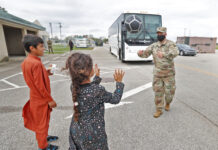MANAGUA, Nicaragua — Police in Nicaragua detained another leading opposition politician and potential presidential candidate Saturday, the latest in a series of moves by President Daniel Ortega that prevent candidates from running against him in his third consecutive re-election bid.
Police said they arrested Arturo Cruz Sequeira, a former ambassador to the United States, under a controversial ‘treason’ law passed in December. Sequeira was considered a contender for the nomination of the opposition Citizens for Liberty party in the Nov. 7 elections.
His arrest follows the detention earlier this week of opposition figure Cristiana Chamorro, who is being held incommunicado at her home on money laundering charges.
Sequeira, who served as Nicaragua’s U.S. Ambassador from 2007-2009, was detained at the Managua airport after he arrived on a flight from Washington D.C., his aides said.
The law passed in December drew international protests because it gives Ortega’s government the power to unilaterally declare citizens “terrorists” or coup-mongers, classify them as “traitors to the homeland” and ban them from running for election.
Given that Ortega has already applied those terms to virtually the entire opposition and the leaders of massive 2018 protests against his regime, the law appears aimed at sweeping aside the last roadblock to Ortega’s continuing his longstanding rule over the Central American nation.
The law bans candidates “who lead or finance a coup … encourage foreign interference, ask for military intervention … propose or plan economic blockades, applaud and champion the imposition of sanctions against Nicaragua or its citizens.”
So far, the United States has imposed sanctions on about 27 people close to Ortega and his wife, Vice President Rosario Murillo, including Murillo herself and three of her children with Ortega. The sanctions are aimed at bringing about free elections.
The law says people designated by Ortega “will be traitors to the homeland, and for that reason may not run for public office.” Treason is punishable by prison terms of up to 15 years.
On Friday, the U.S. State Department called on Nicaragua to free Chamorro, who is being held incommunicado at her home after her laptops and cellphones were taken away.
Chamorro is a potential presidential candidate and the daughter of former President Violeta Barrios de Chamorro.
On Tuesday, the government charged Chamorro with money laundering involving alleged financial irregularities related to the Violeta Barrios de Chamorro Foundation for Reconciliation and Democracy, which she headed. The nongovernmental group is named after her mother. The State Department called for the release not just of Chamorro, but of two foundation employees as well.
“Their detention on trumped up charges is an abuse of their rights, and it represents an assault on democratic values as well as a clear attempt to thwart free and fair elections,” according the U.S. statement.
“Ms. Chamorro’s arrest comes amid unrelenting attacks on pro-democracy presidential candidates and independent media. The Ortega regime has pledged to bar Ms. Chamorro from participating in November elections and, in May, baselessly canceled the legal status of two opposition political parties,” it said.
On Wednesday, police raided the home and placed Chamorro under a form of house arrest, and a court granted a request from prosecutors to bar Chamorro from running in the Nov. 7 elections or holding public office, citing the charges against her.
She was expected to challenge Ortega for the presidency.
Chamorro has said the allegations were trumped up to keep her out of the race.
In January, she stepped down from her role at the foundation. A month later, it closed its operations in Nicaragua after passage of a “foreign agents” law designed to track foreign funding of organizations operating in the country.
In May, Nicaragua’s Supreme Electoral Council cancelled the legal status of the Democratic Restoration Party, which was expected to potentially be a vehicle for an opposition coalition bid against Ortega.
Cristiana Chamorro’s mother beat Ortega to win the presidency in 1990 and served until 1997. Her husband, Pedro Joaquin Chamorro, had run his family newspaper La Prensa and was jailed and forced into exile multiple times by the dictatorship of Anastasio Somoza. He was eventually assassinated in 1978. Cristiana Chamorro is the vice president of La Prensa.



